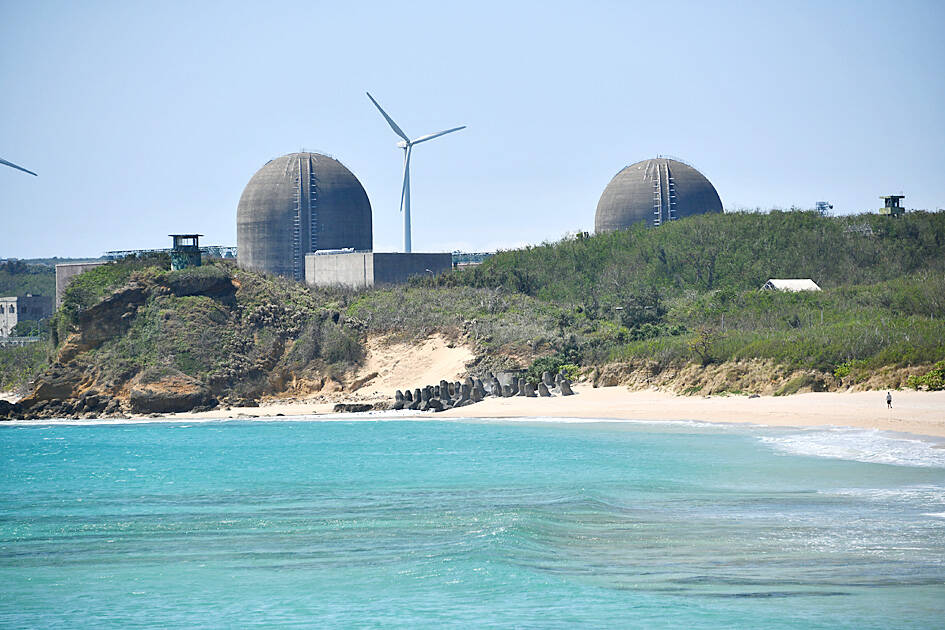Taiwan Power Co (Taipower, 台電) yesterday temporarily shut down the nation’s nuclear energy generation as the state-run utility started regular maintenance on the remaining reactor at the Ma-anshan Nuclear Power Plant for 41 days.
The No. 2 reactor of the nation’s only active nuclear plant in Pingtung County’s Hengchun Township (恆春) is set to be decommissioned next year. The No. 1 reactor has been offline since July.
The shutdown is to perform equipment maintenance and fuel replacement in preparation for the power plant’s next operating cycle, Taipower said in a statement.

Photo: Tsai Tsung-hsien, Taipei Times
With support from other energy sources, Taipower would ensure sufficient power supply during the 41-day period as it aims to maintain its operating reserve margin — or spare capacity at times of peak consumption — at 10 percent during the day and more than 7 percent at night, it said.
Taiwan is poised to become the first non-nuclear nation in East Asia after the No. 2 reactor closes down in May next year, although there is a continuing debate among ruling and opposition parties as well as within society about whether to extend the service life of the Ma-anshan plant amid fears about potential power shortages.
Nuclear power last year accounted for 6.31 percent of the nation’s energy use, which is dominated by coal at 42.24 percent and liquefied natural gas at 39.57 percent, while renewable energy only contributed about 9.47 percent and hydroelectricity 1.08 percent, Energy Administration data showed.
When the Democratic Progressive Party (DPP) took office in 2016, then-president Tsai Ing-wen (蔡英文) proposed a nuclear-free homeland policy by next year, setting a target energy mix of 50 percent natural gas, 30 percent coal and 20 percent renewable energy, but President William Lai (賴清德) is facing greater pressure to review the structure of the energy mix as public worries about the dangers of nuclear energy have been replaced by a fear of power shortages.
It comes as Taiwan’s power consumption is forecast to grow by an average of 2.8 percent per year through 2033, driven mainly by the ever-growing energy use in the artificial intelligence (AI) sector, and as the government aims to achieve net zero carbon emissions by 2050 to help combat climate change.
In an interview with Bloomberg News, Premier Cho Jung-tai (卓榮泰) said Taiwan is “very open” to using new nuclear technology to meet surging demand from chipmakers and the AI industry — one of the strongest signs yet that the DPP government is rethinking its opposition to nuclear energy.
“As long as there is a consensus within Taiwan on nuclear safety, and a good direction and guarantees for handling nuclear waste, with this strong consensus we can have a public discussion,” Cho said on Thursday last week.
“We hope that Taiwan can also catch up with global trends and new nuclear technologies,” the premier said, adding that he has asked Taipower to make sure that personnel related to the decommissioned reactors stay in their jobs.
“This is because we need to prepare for future nuclear technology developments and to respond to any potential legal changes in Taiwan,” Cho said.
Additional reporting by Bloomberg

The Central Election Commission has amended election and recall regulations to require elected office candidates to provide proof that they have no Chinese citizenship, a Cabinet report said. The commission on Oct. 29 last year revised the Measures for the Permission of Family-based Residence, Long-term Residence and Settlement of People from the Mainland Area in the Taiwan Area (大陸地區人民在台灣地區依親居留長期居留或定居許可辦法), the Executive Yuan said in a report it submitted to the legislature for review. The revision requires Chinese citizens applying for permanent residency to submit notarial documents showing that they have lost their Chinese household record and have renounced — or have never

A magnitude 5.6 earthquake struck off the coast of Yilan County at 12:37pm today, with clear shaking felt across much of northern Taiwan. There were no immediate reports of damage. The epicenter of the quake was 16.9km east-southeast of Yilan County Hall offshore at a depth of 66.8km, Central Weather Administration (CWA) data showed. The maximum intensity registered at a 4 in Yilan County’s Nanao Township (南澳) on Taiwan’s seven-tier scale. Other parts of Yilan, as well as certain areas of Hualien County, Taipei, New Taipei City, Taoyuan, Hsinchu County, Taichung and Miaoli County, recorded intensities of 3. Residents of Yilan County and Taipei received

Taiwan has secured another breakthrough in fruit exports, with jujubes, dragon fruit and lychees approved for shipment to the EU, the Ministry of Agriculture said yesterday. The Animal and Plant Health Inspection Agency on Thursday received formal notification of the approval from the EU, the ministry said, adding that the decision was expected to expand Taiwanese fruit producers’ access to high-end European markets. Taiwan exported 126 tonnes of lychees last year, valued at US$1.48 million, with Japan accounting for 102 tonnes. Other export destinations included New Zealand, Hong Kong, the US and Australia, ministry data showed. Jujube exports totaled 103 tonnes, valued at

BIG SPENDERS: Foreign investors bought the most Taiwan equities since 2005, signaling confidence that an AI boom would continue to benefit chipmakers Taiwan Semiconductor Manufacturing Co’s (TSMC, 台積電) market capitalization swelled to US$2 trillion for the first time following a 4.25 percent rally in its American depositary receipts (ADR) overnight, putting the world’s biggest contract chipmaker sixth on the list of the world’s biggest companies by market capitalization, just behind Amazon.com Inc. The site CompaniesMarketcap.com ranked TSMC ahead of Saudi Aramco and Meta Platforms Inc. The Taiwanese company’s ADRs on Tuesday surged to US$385.75 on the New York Stock Exchange, as strong demand for artificial intelligence (AI) applications led to chip supply constraints and boost revenue growth to record-breaking levels. Each TSMC ADR represents